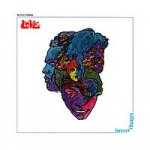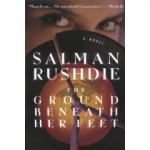You are just a thought that someone
Somewhere somehow feels you should be here
Arthur Lee, “A House Is Not A Motelâ€
 “We change what we remember, then it changes us, and so on, until we both fade together, our memories and ourselves. Something like that.†This is Salman Rushdie on the way our lives intertwine with the history of rock ‘n’ roll. The Ground Beneath Her Feet (1999 ) is a novel about Ormus and Vina, Indians raised in Bombay, who become the first couple of international rock. Propelled by Ormus’ words and melodies and Vina’s voice, they blaze across the rock firmament as VTO (“Vertical Take Offâ€), their lives mirroring the rise and fall of many sacred monsters of rock the last half century.
“We change what we remember, then it changes us, and so on, until we both fade together, our memories and ourselves. Something like that.†This is Salman Rushdie on the way our lives intertwine with the history of rock ‘n’ roll. The Ground Beneath Her Feet (1999 ) is a novel about Ormus and Vina, Indians raised in Bombay, who become the first couple of international rock. Propelled by Ormus’ words and melodies and Vina’s voice, they blaze across the rock firmament as VTO (“Vertical Take Offâ€), their lives mirroring the rise and fall of many sacred monsters of rock the last half century.
 I thought about Rushdie’s novel watching the documentary film Love Story, about the legendary L.A. band Love and their 1967 album “Forever Changes,†the best single album I’ve ever heard, and one of the most enduring albums of what folks still call the “the psychedelic era,” an odd term that reflects the cover art but not the bold lyrics, crystal clear vocals and resonant orchestral sound, acoustic guitars supplemented by symphonic strings and horns. The album is especially loved and respected in England, and British producers Chris Hall and Mike Kelly have made a quiet, fairly typical but informative rock history film, with vintage footage and interviews with Arthur Lee, the dark genius of the group, as well as Bryan MacLean and Johnny Nichols, who all played a critical roll in forming the band’s charismatic image as an early racially-mixed rock group. Recorded by folk the label Elektra, Love was not promoted very effectively in rock venues. They also refused to tour much outside L.A. Not burnt-out cases, really. They just faded out, disappeared. So the album “Forever Changes†has survived and thrived by word-of-mouth, although several years ago Rolling Stone placed it # 40 on the list of 500 greatest albums. My sons ride me for thinking it #1, but there you have it. “Forever Changes” is lodged there as firmly as Venus in my rock firmament.
I thought about Rushdie’s novel watching the documentary film Love Story, about the legendary L.A. band Love and their 1967 album “Forever Changes,†the best single album I’ve ever heard, and one of the most enduring albums of what folks still call the “the psychedelic era,” an odd term that reflects the cover art but not the bold lyrics, crystal clear vocals and resonant orchestral sound, acoustic guitars supplemented by symphonic strings and horns. The album is especially loved and respected in England, and British producers Chris Hall and Mike Kelly have made a quiet, fairly typical but informative rock history film, with vintage footage and interviews with Arthur Lee, the dark genius of the group, as well as Bryan MacLean and Johnny Nichols, who all played a critical roll in forming the band’s charismatic image as an early racially-mixed rock group. Recorded by folk the label Elektra, Love was not promoted very effectively in rock venues. They also refused to tour much outside L.A. Not burnt-out cases, really. They just faded out, disappeared. So the album “Forever Changes†has survived and thrived by word-of-mouth, although several years ago Rolling Stone placed it # 40 on the list of 500 greatest albums. My sons ride me for thinking it #1, but there you have it. “Forever Changes” is lodged there as firmly as Venus in my rock firmament.
If you haven’t heard it, it is never too late.
 The Ground Beneath Her Feet tells us it is too late for some things, but not for rock ‘n’ roll. Rushdie’s hip narrative is laced with allusions to real rock history, from the hard rains that are gonna fall to the raindrops fallin’ on your head, from itinerant tinkers to techno industrialists, from hip to hip-replacement. Ormus and Vina shadow rock’s passage from anonymous blues to Elvis, Dylan, the Beatles, and to the next raw recruit: star-hopeful, irony-deficient, singing in no-holds-barred innocence. The stage is crowded with impersonators, of course. When the mask slips, and they stand naked and a bit surprised, there is evolution, change, new stars in the sky. Rushdie’s twisting history of rock is subversive, polyphonic and democratic; performers and fans cross frontiers of race, skin, religion, language, history, nation, class.
The Ground Beneath Her Feet tells us it is too late for some things, but not for rock ‘n’ roll. Rushdie’s hip narrative is laced with allusions to real rock history, from the hard rains that are gonna fall to the raindrops fallin’ on your head, from itinerant tinkers to techno industrialists, from hip to hip-replacement. Ormus and Vina shadow rock’s passage from anonymous blues to Elvis, Dylan, the Beatles, and to the next raw recruit: star-hopeful, irony-deficient, singing in no-holds-barred innocence. The stage is crowded with impersonators, of course. When the mask slips, and they stand naked and a bit surprised, there is evolution, change, new stars in the sky. Rushdie’s twisting history of rock is subversive, polyphonic and democratic; performers and fans cross frontiers of race, skin, religion, language, history, nation, class.
The story is told by Rai, a photographer who has documented, as a fashion and war photographer, how rigid those boundaries can be in zones other than rock. Rai’s been to the places where cratered roads and snipered alleys separate and isolate individuals. And he’s followed Ormus and Vina to the forums where rock fans clump and congregate. Ormus’ songs inspire, but also challenge. The final banality is that his songs often become anthems to the very fans they mock.
And then they’re gone. “The Ground Beneath Her Feet†is a great love story, an old one, Orpheus and Eurydice, with all the willful blindness of tragedy. Vina disappears and Ormus can’t bring her back. In rock’s greatest moments we know we’ve failed to save the thing we love. But something new is born in the ashes. The music and its meaning are memory and change. Rock makes the instability of modern life seem like possibility.
Many of us would echo what Rai says about music and our times: “In my lifetime, the love of Ormus and Vina is as close as I’ve come to a knowledge of the mythic, the overweening, the divine. Now that they’ve gone, the high drama’s over. What remains is ordinary human life.†I feel that mythic sense listening to “Forever Changes,†the extraordinary running through the ordinary.
But we want something beyond the song, the magic, the nostalgia, the pastiche of a higher love. Rai muses: “When we stop believing in the gods we can start believing in their stories, I retort. There are of course no such things as miracles, but if there were and so tomorrow we woke up to find no more believers on earth, no more devout Christians, Muslims, Hindus, Jews, why then, sure, the beauty of the stories would be a thing we could focus on because they wouldn’t be dangerous any more, they would become capable of compelling the only belief that leads to truth, that is, the willing, disbelieving belief of the reader in the well-told tale.â€
The tale told in The Ground Beneath Her Feet, for example. Or the stories told in the songs on “Forever Changes.”